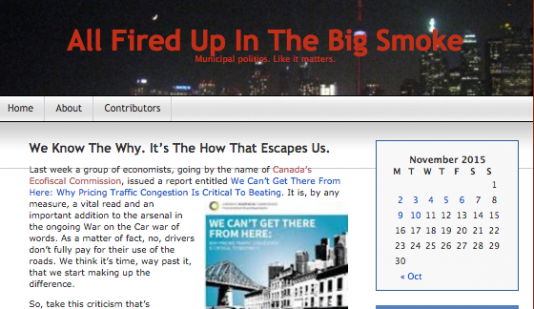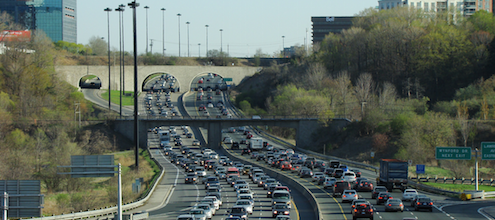
All Fired Up about Congestion Pricing
The following piece, by well-known and well-read Toronto blogger Cityslikr, was originally published on All Fired Up in the Big Smoke: “a blog about living in the city. More specifically, a blog about the politics of living in a city.” While we don’t agree with all of the author’s critiques, we think they are fair, thoughtful, and worth sharing. Stay tuned for future blogs where we address these, and other challenging issues, related to congestion pricing.
We know the why. The how escapes us.
By Cityslikr
Last week a group of economists, going by the name of Canada’s Ecofiscal Commission, issued a report entitled We Can’t Get There From Here: Why Pricing Traffic Congestion Is Critical To Beating It. It is, by any measure, a vital read and an important addition to the arsenal in the ongoing War on the Car war of words. As a matter of fact, no, drivers don’t fully pay for their use of the roads. We think it’s time, way past it, that we start making up the difference.
So, take this criticism that’s forthcoming in the spirit intended, from someone who is totally behind the concept of road pricing. And forgive me if I wind up mixing this report with the panel discussion I attended on Tuesday, a week ago, the day following the report’s release. That may well have been more market-oriented, let’s say, than the document that gave rise to it, colouring my impression of the report in a way that might not be there in just the words that are written.
The Costs of Road Pricing Infrastructure
As thorough as this report is, I couldn’t help think it glossed over a couple key issues. The first is the cost of the infrastructure necessary to implement any type of road-pricing option. One of Tuesday’s panelists, Postmedia’s Andrew Coyne, gave the impression that it was as easy as handing out transponders and, Bob’s yer uncle. The money just starts flowing in.
The high cost of implementing road pricing is often an impediment to jurisdictions. If it costs more than it brings in, how will that help already cash-strapped municipalities, even with financial assistance from similarly cash-strapped senior levels of government? The report points out that even the highly successful London, England congestion charge system doesn’t yet pay for itself. Isn’t such a high cost prohibitive to the idea of rolling out the pilot projects the report emphasizes as necessary to contend with the inevitable pushback to road tolls that will initially happen from the driving public?
This, of course, speaks to one of the more important points the report highlights: determining the objectives of road pricing right from the outset. It might not be about generating revenue, a “tax grab”, to use the common parlance. It is possible a reasonable toll rate cannot pay for itself plus produce extra money in which to re-invest into other projects or meet simple maintenance demands. So why on earth would any government pursue such a policy?
Road pricing might be pitched as a basic matter of fairness, making drivers pay more toward the true cost of their mobility choice. Tolls could also act as a disincentive to driving, a nudge to try other transportation modes. A tool of behavioral modification to get people out of their cars and into more active ways of getting around.
State your reason(s) for pursuing a policy of road pricing and get busy selling to the public, a very wary public it will be too.
Getting Public Buy-In
Bringing me to my second bone of contention with this report and the public presentation I saw. How to get an initial buy-in from the public, this wary public, this voting public. It’s the biggest nut to crack, in my opinion, one too easily treated as simply an after-thought, a matter of basic information delivery and education.
The panel discussion leaned too heavily in its blasé, free-market approach to the matter. The ‘We’re all rational actors reacting rationally to rational discussion and market determined price points’ point of view. Generally speaking, I have trouble with that angle of argument, and specifically, when it comes to the topic of cars and driving.
We’re in no way rational when it comes to our driving habits. If we were, the rational argument that single-occupancy vehicles are the most irrational, most expensive, least efficient way of moving people around a city and region would have won out decades ago.
That the primacy of cars still prevails, that any challenge to it has to be couched in delicate terms, is proof positive that driving and reliance on private automobiles remains divorced from reality. Pointing out that pricing road use works well in other places may convince a few of the unconvinced but it usually leads to the pushback reaction of: Well, we’re not other places. The ludicrousness of the debate about tolls (or other forms of de-congestion taxation like the recent transit-directed sales tax increases in California) having to put some of the money raised back into new road construction reveals just how ingrained driver privilege and unreasonableness truly is.
None of this is to say that the We Can’t Get There From Here report isn’t invaluable.
Any promotion of a reasoned debate on road pricing should be welcomed and read thoroughly. Its arguments shouted to and from the hilltops.
But if it doesn’t come with helpful suggestions how to successfully sell road pricing to a skeptical, unwilling public, its benefits will be limited. We have been talking about this (along with other ways of funding our way out of congestion) for some time now. Very little traction has been made. One of the panelists last week, Cherise Burda, sat on the Ontario Transit Investment Strategy Advisory Panel chaired by Anne Golden that 2 years ago tabled revenue generation ideas to be dedicated to building public transit initiatives. Two years ago! With very little subsequent movement since.
“If it were an easy thing to do,” Premier Kathleen Wynne said at the time, “it would have been done already.”
So much so that her government has chosen instead to pursue the unpopular goal of selling off 60% of a public utility in order to raise money for public transit. Without public support, there will be little political courage to put a true cost to driving, tolls, taxes or otherwise.
A report that tells us how to convince the driving public to pay more for the privilege of doing what they think they already pay more than enough for is the report we really need right now.
Cityslikr is a regular contributor to the municipal politics blog All Fired Up in the Big Smoke. Follow him at @cityslikr




Comments are closed.